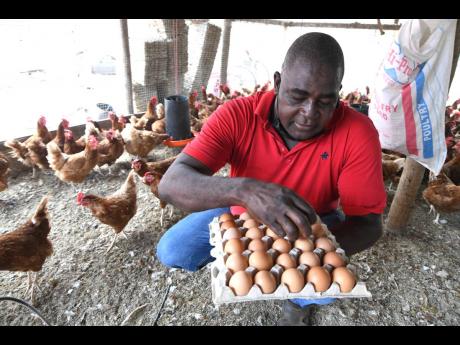Egg prices trending up for Christmas
Consumers could be paying more for table eggs for Christmas as the Jamaica Egg Farmers Association (JEFA) has recommended that its members increase their farm gate prices from $350 to $380 per dozen for loose eggs and to sell branded eggs at $410 per dozen, up from $380.
In an advertisement in The Sunday Gleaner last month, the association cited the ongoing increases in the cost of production since last year as the main reason for its recommendation, adding that it was essential for Jamaica to retain is self-sufficiency in table eggs.
The JEFA cannot and does not set egg prices.
Increases in the cost of feed as well as layer birds have already forced some small farmers out of businesses, while others have scaled down their production.
Feed, which accounts for between 60 and 70 per cent of the overall production cost of eggs, has moved up by about 40-odd per cent since the start of the year, according to JEFA President Mark Campbell.
The association has worked out the production cost for 12 eggs at more than $300, hence its price increase recommendation. Its research has also shown that most smaller farmers were failing to factor in things such as electricity, water and the cost of fuel for delivery as well as the climbing foreign exchange rate on their operations.
Many farmers are finding it increasingly difficult to make a profit on their investment and in many cases even to meet production costs because they are operating at a loss, JEFA Manager Doreen Hibbert told The Gleaner.
“So we had to go back to the drawing board and recalculate and realise that it is costing us over $300 to produce a dozen eggs. So we agonised over it; we can’t set the price, it is a recommended cost on what it is costing to produce, so we are not attempting in any way to take advantage of consumers,” she added.
Campbell explained that a chicken will take an average of four pounds of feed to produce a dozen eggs. When laying at peak production, upward of 90 per cent of the white layers take four pounds but the brown ones will take anywhere between an extra half to a pound. It eats more and lays less because it is a bigger bird, he explained.
“We have found ourselves in a very difficult situation because whereas when the pandemic started, we went to our customers for a price adjustment, none of them objected [as] they were experiencing increases in all other food items and so they didn’t have a big problem,” the JEFA president said.
“However, when it continued over the last six months now and with other [expenses climbing] because of the almost weekly increase in fuel and the slide of the Jamaican dollar against its American counterpart, things are not looking good for us in the Christmas because you have to remember that everything for eggs is imported,” he added.

